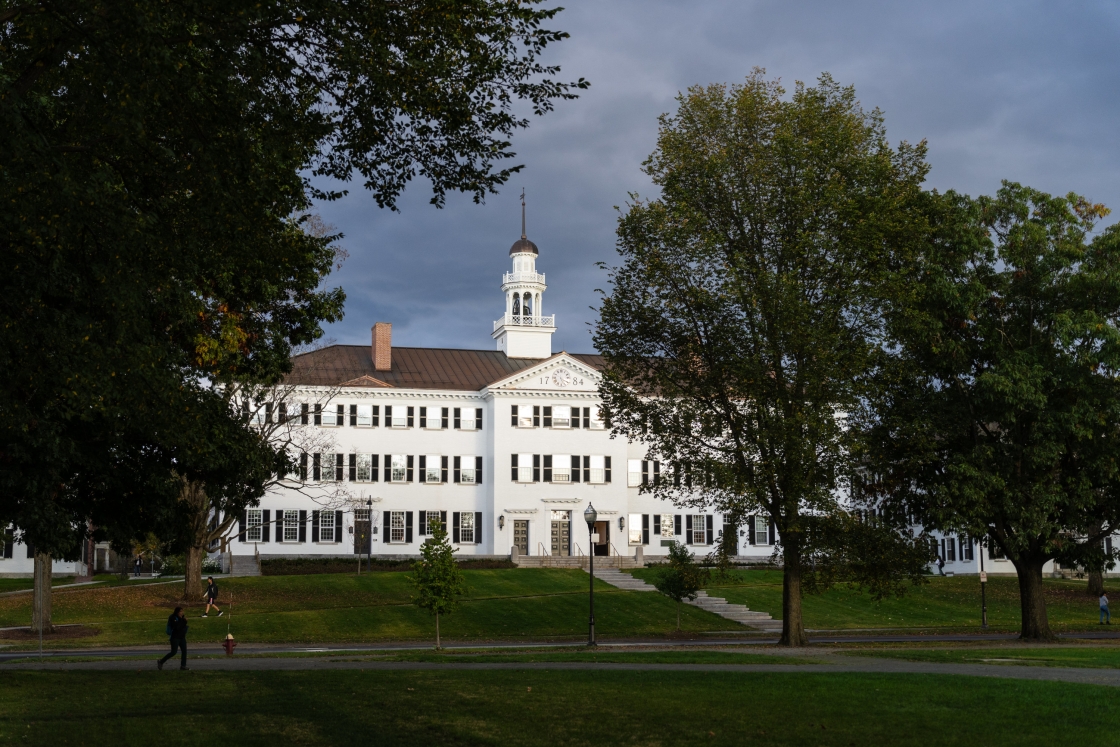Effort funded faculty and student priorities from 2002 to 2009
Dartmouth College has completed a seven-year, $1.3 billion fundraising campaign that has enhanced its place as a leader in American higher education. A total of 65,174 alumni, parents, friends, faculty, students, staff, and organizations participated in the campaign, including 70 percent of alumni.Vital investments in dozens of initiatives moved the curriculum into emerging fields of study, increased student scholarships, and provided faculty and students with the facilities and tools to do their best work.
“The campaign was an investment in the enduring attributes of Dartmouth that attracted me to this place—a personalized educational experience, commitment to providing all students the means to aspire to a Dartmouth education, and an experience that equips students with the ability to develop expertise throughout their lives and contribute to the betterment of society,” said President Jim Yong Kim.Image 

Background and Leadership
The Campaign for the Dartmouth Experience began July 1, 2002, and launched publicly November 13, 2004. The largest fundraising effort in the College’s history, it included the undergraduate college and three professional schools and supported the strategic goals of then President James Wright as described in his administration’s “Forever New” vision paper. The campaign closed as planned on December 31, 2009, achieving a total of $1.308 billion.All gifts were designated during the campaign, supporting annual operations, funding endowments specified by donors for particular priorities, and providing capital for new facilities. Professional school achievements include $177 million raised for Dartmouth Medical School, $61 million for Thayer School of Engineering, and $125 million for Tuck School of Business.
Brad Evans, Class of 1964; Peter Fahey ’68, Thayer ’70; and Steve Mandel ’78 co-chaired the campaign and led the twenty-member Campaign Executive Committee. Russ Carson ’65 was a co-chair during the nucleus phase. Co-chairs of the professional schools’ campaigns were Peter Fahey, Al Griggs, and the late Peter Williamson ’58 for Dartmouth Medical School and Dartmouth Hitchcock Medical Center; Charles Nearburg ’72, Thayer ’74 for Thayer School of Engineering; Bill Achtmeyer, Tuck ’81, the late Jim Allwin, Tuck ’76, and Paul Raether, Tuck ’73, for Tuck School of Business.
Dozens of alumni and parents played crucial volunteer roles raising annual gifts through the Dartmouth College Fund, the Parents and Grandparents Fund, and annual funds for the three professional schools.
“The campaign was led by Jim Wright until he stepped down last June, and met its goal during the first six months of Jim Yong Kim’s presidency,” said Ed Haldeman, chair of Dartmouth’s Board of Trustees. “On behalf of the trustees who served during the years of the campaign, and my predecessor as chair of the board, Bill Neukom ’64, I salute all members of the Dartmouth community who helped the College meet an ambitious target. I especially thank Brad Evans, Peter Fahey, Steve Mandel, and Russ Carson for the volunteer leadership they provided throughout the seven years.”
Achievement
$407.3 million was made in gifts to endowments designated by donors for a specific purpose that will be supported by those invested dollars for generations. Current-use gifts totaled $530.8 million and were restricted for particular programs or purposes or spent in the year they were received. Gifts toward new and renovated facilities totaled $344.7 million.The largest gifts were also the biggest in Dartmouth’s history: $50 million each from two anonymous donors. One gift will support the Visual Arts Center, the other a number of priorities across the institution. Two gifts were made at the $25-$49.9 million level, sixteen at $10-$24.9 million, twenty-seven at $5-$9.9 million, and 163 at $1-$4.9 million. More than 900 donors gave between $100,000 and $1 million, and roughly 64,000 donors made vital contributions to the student experience in amounts up to $100,000.
The campaign’s many achievements include:
Advancing the curriculum into emerging fields by establishing
- Four distinguished endowed chairs and seventeen endowed professorships in the undergraduate college, and fourteen in the professional schools, recognizing groundbreaking work in fields such as computational science, digital humanities, and sustainability science.
- Five funds for scholarly innovation to support the early-stage research of faculty poised to make important advances in areas including sustainability and technology.
- $122 million in undergraduate scholarship endowments to offset the more than 20 percent increase in students seeking financial aid.
- $5 million for Thayer School fellowships, including Innovation Program Fellowships for students in the nation’s first doctoral-level engineering innovation program, and $12.7 million for Tuck School.
- Contributing toward the cost of constructing eighteen state-of-the-art facilities to meet academic, residential, and athletic needs.
- Supporting dozens of programs in areas including the Center for the Advancement of Learning, arts, athletics, ethics, international studies, leadership development, one-on-one work with faculty, religious life, undergraduate business initiative, volunteer service, and writing and rhetoric.
- Raising $270.7 million in unrestricted annual gifts through the Dartmouth College Fund and annual funds of the professional schools, directly supporting the ongoing student experience.
The Future
The campaign met the vast majority of the objectives set forth in 2002, and fundraising will continue to address unmet needs.“This was an impressive achievement, and yet our future operations will continue to be adversely affected by the reduction in value of our endowment caused by the financial crisis and the need for lower distributions from the endowment at a sustainable level,” said Board Chair Ed Haldeman. “We celebrate the many ways Dartmouth has been enhanced by our generous donors in this campaign and recognize that these achievements do not reverse the negative impact of our endowment losses.”
Said President Kim, “We owe our co-chairs and the Board of Trustees our deepest gratitude. And we thank our development team for their persistence and skill in managing the effort. We are poised now to plan new strategic initiatives that will prepare Dartmouth students to excel in their life’s work.”
dartmouthexperience.org has details on the campaign and philanthropy to Dartmouth.

